Renewal on the River
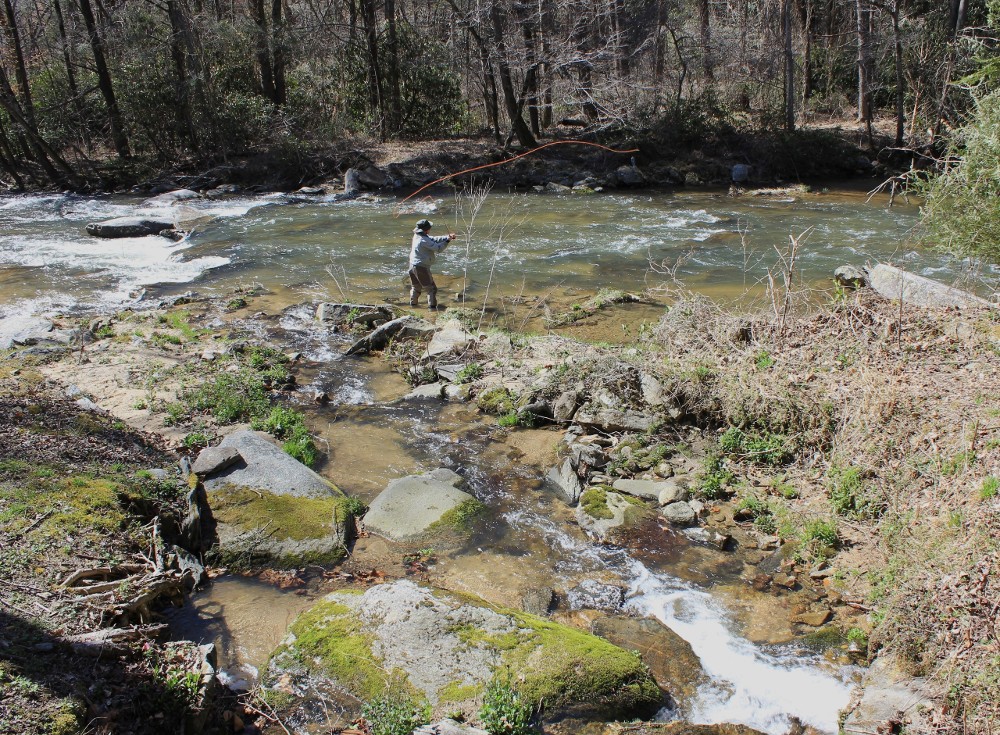
On a blustery afternoon in March, a small group came out to fly fish on a private stretch of the Rocky Broad River, in Bat Cave. It was a bright day—finally blue sky after days of rain. The river was full, with cold, clear water rushing over rocks and pooling in eddies. The trees were still bare but the first wildflowers had emerged. Crimson trilliums popped through the moss and spicewood braches were yellow with tiny flowers.
It was a special occasion, to fish a beautiful stretch of river on a private nature preserve. But the conditions weren’t optimal for catching fish. The water was high, so trout were more focused on making their way in the strong current than biting for food. The wind made it hard to cast a line and the flies didn’t always land where you’d hoped—sometimes snarling in branches. Of the four people fishing, only one caught any fish.
Still, it was a perfect day. One of the fishermen, Jim O’Neil, describes himself as a Christian who cherishes prayer. This time on the river, he said, expands that sense of prayer. It fills him up.
The Way of Water
The outing was called “The Way of Water: Fly Fishing as Contemplative Practice.” Tanner Pickett, who leads these events about once a month at Conserving Carolina’s Transfiguration Preserve, says, “Sometimes people come out here without knowing what they’re getting into. Sometimes, their wife signed them up. And they’re like, ‘What? You want me to close my eyes?’”
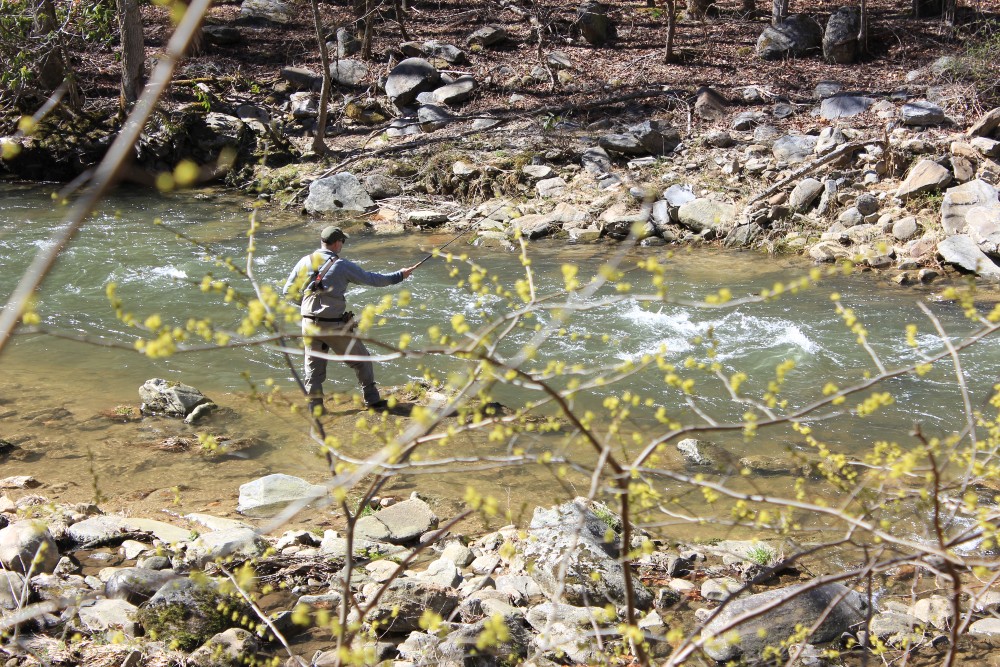
It starts on a mossy slope near the rocky riverbank. If you want, you can close your eyes. Tanner invites you to “be where your feet are.” To feel the brisk air on your face. Hear the loudness of the flowing water, the treetops full of wind. Notice what you can smell—maybe some freshness from new growth or smoke from a nearby chimney.
After the guided opening, you’re free to explore the river, to wade into pools and cast for fish. If you do catch a fish, Tanner suggests, take a good look before you release it. Look into the fish’s eyes and understand that you’re not just seeing the fish; the fish is also seeing you. “That’s an extraordinary thing, I think—to be seen by a fish.”
He suggests that when you first go down to the river, touch the water. Feel its coldness. As the day goes on, it’s natural to get caught up in other thoughts or to fixate on your goal of getting a fish. When that happens, he suggests, touch the water again. It’s a way to remember where you are. On the river. In the forest. In this life.
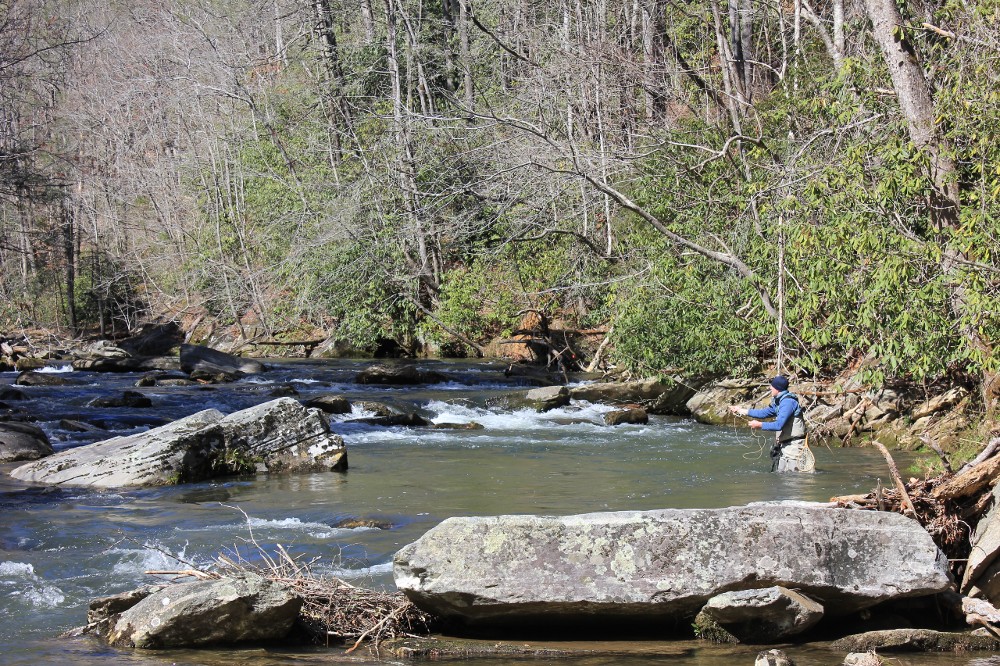
Frustrating or Renewing?
For many people who fish, there’s always some of this quality—slowing down, connecting with nature, finding a more peaceful self.
But it’s a practice to tap into that, Tanner says. Because fishing can also be full of distraction, frustration, and ego, depending how you go into it.
Tanner started fly fishing when he moved to Black Mountain eleven years ago with his wife and baby daughter. Before, his main sport was kayaking, but fishing seemed like something he could do with his shorter time windows as a new dad.
He says, “ I would try to get out of the house early before the family woke up. I would put all my gear in the car and fly to the river. I would try to get my fly tied on my line. I would cast a little bit. The whole time I’m watching my watch to make sure I’m home on time. What I realized is that I spent so much time worrying that I would totally miss the experience. And when I didn’t catch a fish or my line got hung up, it wound up being more of a frustrating thing than a renewing thing.”
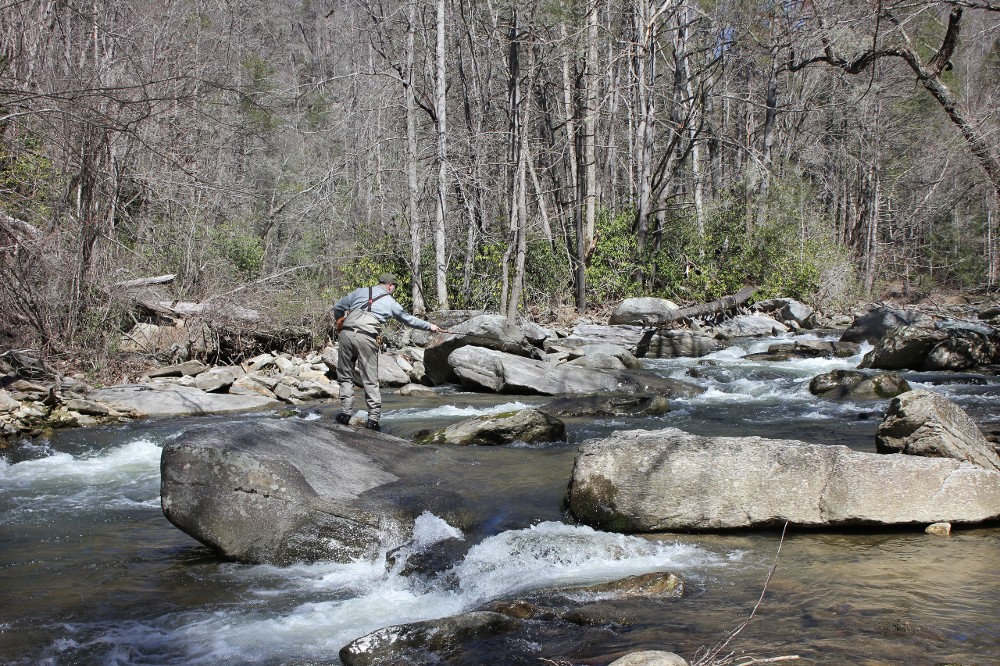
Now, he tries to leave thoughts and worries—which he can always come back to, if he needs—and be present with the whole experience, from the drive out to the drive home.
He says, “Getting to the river and taking a moment to appreciate the river and all of the things that are created in that space helps me have a much different approach to fishing. And I find that I come home feeling much more grateful and much more renewed.”
Renewal—from Yoga to Fishing to Games
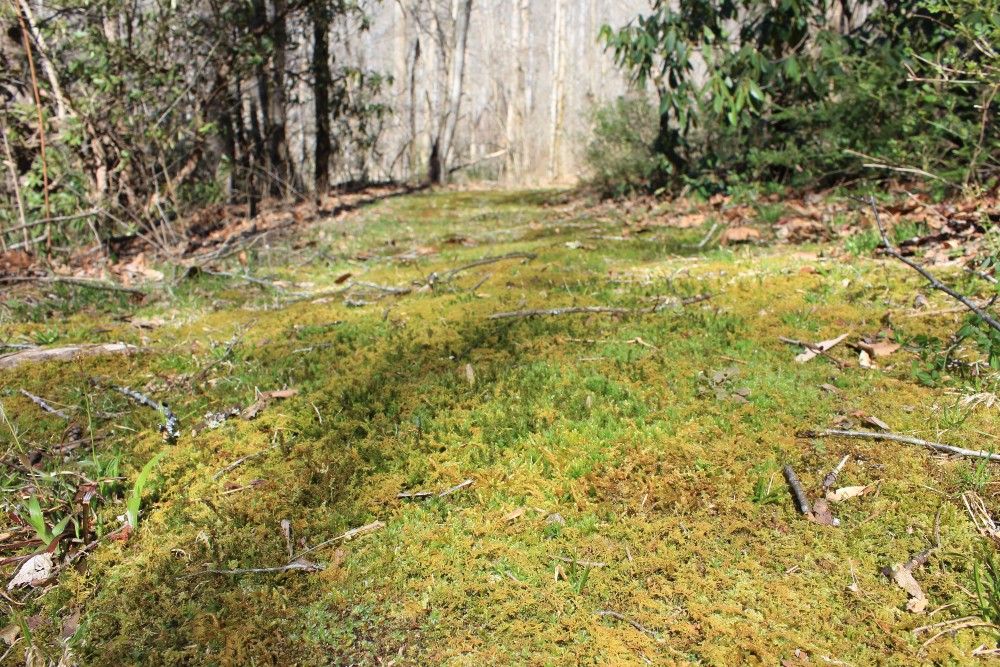
Tanner, who works as Vice President for Communications at Montreat Conference Center, started studying contemplative practive about eight years ago. He describes it as “slowing down and being intentional with what you do. You can find the divine by stopping and thinking clearly and maybe experiencing life that we sometimes we just miss.”
At the center, he helped develop a program called Discovering Renewal. Oriented to pastors and church professionals, it begins the day after Easter and offers respite from burnout through rejuvenating activities. Tracks include yoga, hiking, fly fishing, art, and tabletop gaming.
As Tanner explored his own interest in contemplative practice, he heard about the forest bathing walks that Dr. Mattie Decker was leading at Transfiguration Preserve in Bat Cave.
This mountain land was owned for over a century by an order of Episcopal nuns called Community of the Transfiguration, which serves poor communities in Cincinnati, Ohio. This land was the sisters’ retreat—their place to find renewal. In 2015, the sisters worked with Conserving Carolina to protect their land, which became Transfiguration Preserve. Including later additions, the preserve now spans over 525 acres. Most of this land is now owned by Conserving Carolina, but the sisters still own a retreat house and another small home there.
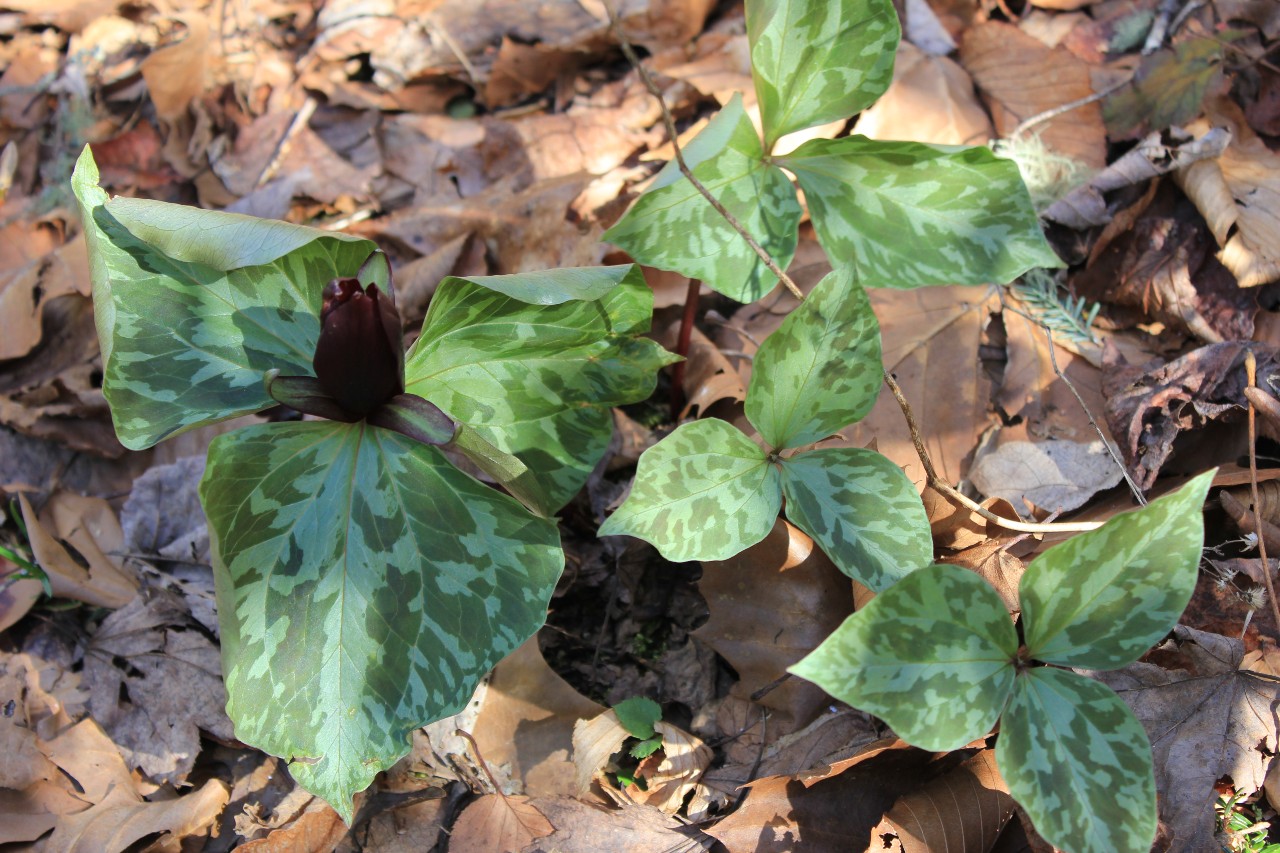
Mattie is an Episcopal oblate—or a layperson associated with the sisters—and she lives at the preserve, where she leads forest bathing activities. She’s a certified Nature and Forest Therapy Guide and she is taking on a new role as director of the order’s expanding ministry in Bat Cave.
Mattie describes forest bathing as the practice of mindfulness in nature. It’s a healing practice of immersion in the forest, opening to nature with all of your senses.
Since Mattie began guiding forest bathing walks in 2019, offerings at Transfiguration Preserve have expanded to include yoga, art, music, writing, and other activities in nature, with various leaders.
What About This River?
When Tanner came out for a forest bathing walk, he told Mattie about his contemplative fly fishing outings. Her eyes went wide and she told him there was something he needed to see. She took him down to the Rocky Broad where it flows through Transfiguration Preserve. “Would you lead an experience like that here?” she asked.
Tanner took in the gorgeous plunging river, at its confluence with a creek with a waterfall just upstream.
He says his answer was, “Why, yes.”
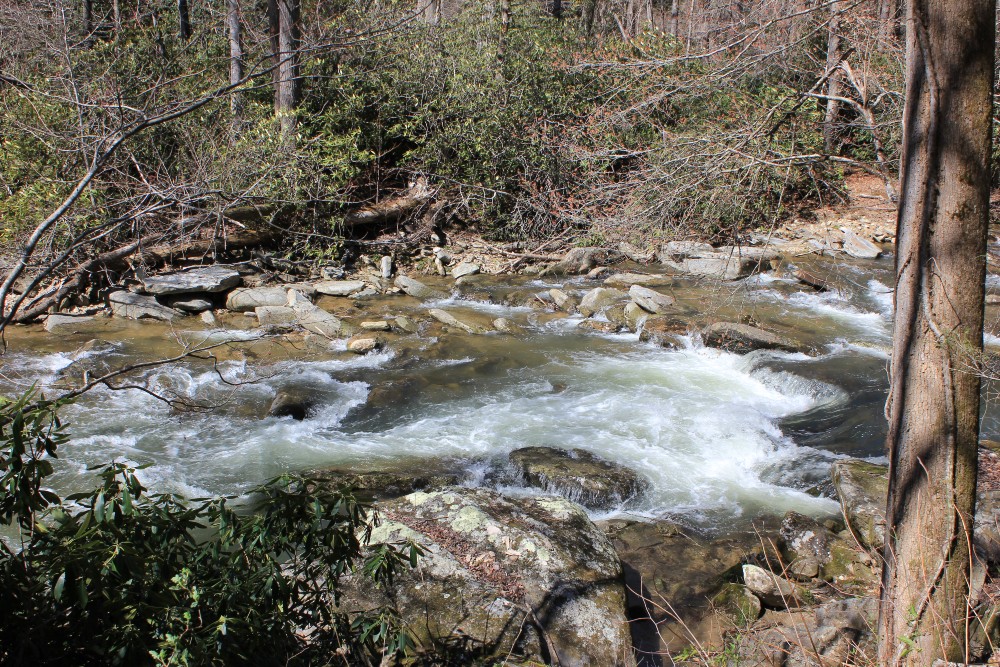
Now, Tanner volunteers regularly to lead fly fishing at the preserve. These and other forest bathing events can be found on Conserving Carolina’s website at conservingcarolina.org/calendar.
Forest bathing originated in Japan, where it was offered as a form of medicine. In recent years, the practice has gained wider attention, with new research supporting its health benefits.
Tanner says, “It opened my eyes when I started learning about the scientific benefits. The trees are giving off essential oils and you’re breathing them in. The ripples on the water can have a mental calming effect. All of this is freely given, if you just notice and you take the time to appreciate.”
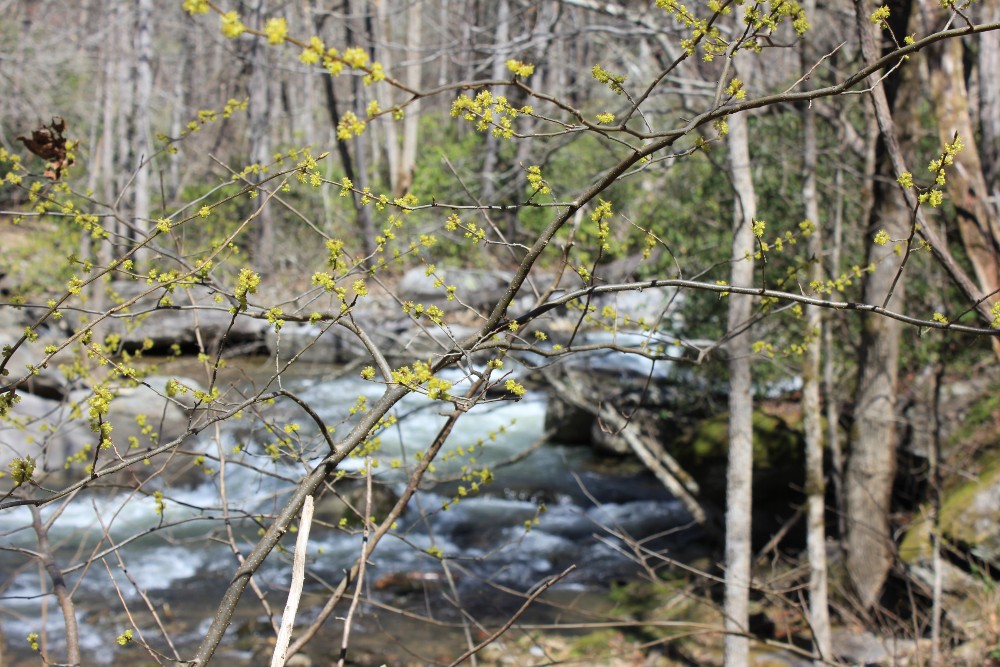
Article by Rose Jenkins Lane